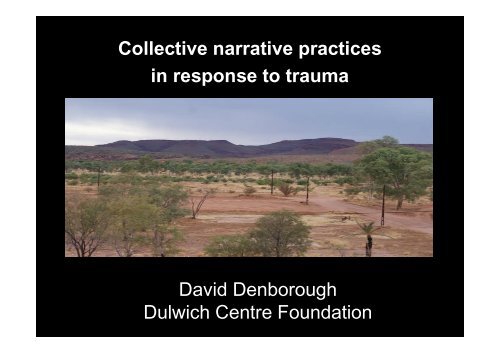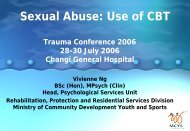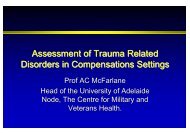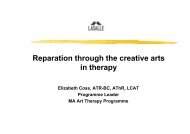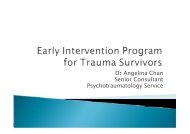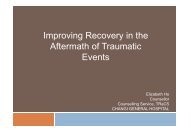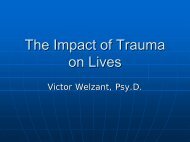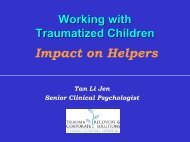Mr David Denborough
Mr David Denborough
Mr David Denborough
Create successful ePaper yourself
Turn your PDF publications into a flip-book with our unique Google optimized e-Paper software.
Collective narrative practices<br />
in response to trauma<br />
<strong>David</strong> <strong>Denborough</strong><br />
Dulwich Centre Foundation
• Welcome<br />
• Introducing key principles through<br />
example of working with an individual in an<br />
isolated context – how can collective<br />
narrative practices be used in this context?<br />
• Collective documentation of skills and<br />
knowledges<br />
• Linking storylines and songlines<br />
• Tree of Life: an approach to working with<br />
vulnerable children
Key principles:<br />
• To find a way to richly acknowledge the<br />
real effects of the hardship/abuse<br />
• To listen for double-storied accounts –<br />
storyline of hardship AND storyline of what<br />
people give value to (responses to<br />
hardship, skills and knowledge)<br />
• To link lives and experiences to some sort<br />
of collective<br />
• To enable individuals, groups,<br />
communities to make a contribution to the<br />
lives of others
Nine years old, nine years young<br />
Nine years old<br />
Nine years young<br />
First locked up in a boys’ home<br />
40 years on<br />
Looking back now<br />
I don’t know how that kid survived<br />
Was just life at nine
Just had to adapt<br />
Just had to cope<br />
Find ways to get by in the institution<br />
They did things to him<br />
He did not want to do<br />
He knew it was wrong<br />
He knew it then
When he was nine years old<br />
Nine years young<br />
First locked up in a boys’ home<br />
40 years on<br />
Looking back now<br />
I don’t know how that kid survived<br />
Was just life at nine<br />
He knew he had to keep it quiet<br />
Make sure his parents did not know<br />
But 40 years on it’s time for speaking<br />
He knows
• To conceive of the person/people meeting<br />
with us as representing a social issue<br />
• To enable the person/people to join a<br />
collective endeavour in addressing, in<br />
some local way, this social issue<br />
• To enable people to speak through us not<br />
just to us
1. The name of a special skill, knowledge,<br />
practice or value that gets you or your family<br />
through hard times<br />
2. A story about this skill, knowledge, practice or<br />
value, a time it made a difference to you or<br />
others<br />
3. The history of this skill, knowledge, practice or<br />
value: how long has this been with you, who<br />
did you learn it from/with?<br />
4. Is this linked in some way to collective<br />
traditions (familial/community) and/or cultural<br />
traditions? Are their proverbs, sayings,<br />
stories, songs, images from your family,<br />
community and/or culture with which these<br />
skills and knowledges are linked?
Ibuka: ‘Remember’<br />
National association of genocide<br />
survivors in Rwanda
Kaboyi<br />
Benoit
‘the invention of unity in diversity’<br />
Paulo Freire (1994, p.157)<br />
Pedagogy of hope: Reliving Pedagogy of the oppressed.<br />
New York: Continuum.
‘communitas’ Victor Turner<br />
a shared sense of unity among<br />
individuals which …<br />
‘preserve individual distinctiveness’<br />
‘is not a merging in fantasy’<br />
do not depend on ‘in-group versus outgroup’<br />
opposition<br />
Turner, V. (1969). The ritual process: Structure and anti-structure.<br />
New York: Aldine de Gruyter.
Producing and documenting a ‘social<br />
memory’ of resistance and sustenance:<br />
‘They will remember that we were sold<br />
but they won’t remember that we were<br />
strong. They will remember that we<br />
were bought, but not that we were<br />
brave’<br />
William Prescott
• Listening for the shared values,<br />
the self-transcending ideals, that<br />
are implicit within survivors’<br />
expressions of anguish
• Noticing and acknowledging<br />
ways in which survivors have<br />
carried on these ideals
• Making it possible for<br />
survivors to name these<br />
shared ideals
• Inviting survivors to tell stories<br />
about the social histories of these<br />
ideals, where they come from,<br />
and with whom they are shared
• Creating contexts in which<br />
survivors can contribute to the<br />
perpetuation of these shared<br />
ideals
Yia Marra: Good stories<br />
that make spirits strong
The Tree of Life<br />
narrative<br />
approach: born<br />
from a<br />
collaboration<br />
between REPSSI<br />
and Dulwich<br />
Centre Foundation<br />
and between<br />
Ncazelo Ncube &<br />
<strong>David</strong> <strong>Denborough</strong>
Key principles:<br />
* ‘Riverbank’ position<br />
* People always respond<br />
* Implicit in responses are skills,<br />
abilities and special knowledges<br />
* There is always a social history to<br />
these<br />
* Rich story development
Part One<br />
- Drawing a Tree of Life<br />
- Riverbank position
Roots: Where we come from<br />
– rich textual heritage
Ground:<br />
Where we live, what we do each day
Trunk: Our skills, values<br />
- what people value/care about<br />
- think collectively<br />
- through the eyes of others<br />
- trace the histories<br />
- rich stories
Branches<br />
Our hopes, dreams & wishes<br />
- combination of big hopes and<br />
smaller<br />
- self, family, community<br />
- hopes have a history (trace them!)
Leaves: Those who are special<br />
to us<br />
- Alive or no longer living
Fruits<br />
What those special people have<br />
given to us<br />
Seeds<br />
Gifts we wish to give to others
Part Two: Forest of life<br />
- Moving from individual to<br />
collective
Part Three: The storms of life<br />
- Collective disclosure<br />
- Externalising the problem
Part Four: Celebration,<br />
certificates & song
Enabling contribution
Dulwich Centre Foundation<br />
www.dulwichcentre.com.au<br />
dulwich@dulwichcentre.com.au<br />
www.narrativetherapylibrary.com<br />
Find us on Facebook


